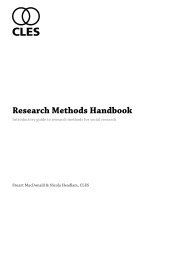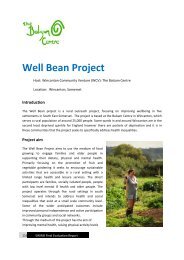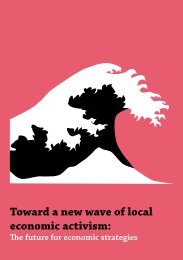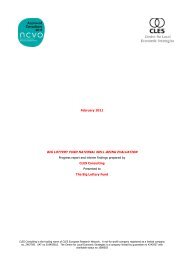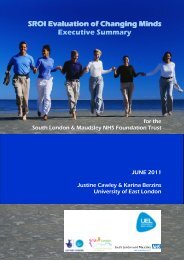Productive local economies: creating resilient places CLES
Productive local economies: creating resilient places CLES
Productive local economies: creating resilient places CLES
You also want an ePaper? Increase the reach of your titles
YUMPU automatically turns print PDFs into web optimized ePapers that Google loves.
and makes some <strong>places</strong> hostage to impossible aspirations. Where growth is<br />
achieved, it is important that it is robust and used effectively within a location,<br />
complementing place identity and community aspirations, and does<br />
not simply evaporate when an area experiences an economic shock. The<br />
recent recession has uncovered a number of areas where solid levels of economic<br />
growth achieved through the boom years have not been sustained<br />
as investment and jobs have drained away at the first sign of trouble. In<br />
addition, we are seeing successful areas which do have economic growth<br />
adopting even more aggressive growth strategies without due regard for<br />
the place, culture and identity or indeed the environmental consequences,<br />
both <strong>local</strong>ly and globally.<br />
Economic development needs to become less one dimensional<br />
Local economic policy needs to absorb and be reflected in the broader,<br />
more qualitative aspects of place development, accommodating the<br />
breadth of social, cultural, economic and environmental facets that are<br />
part of a whole networked system within a <strong>local</strong>ity. It must not simply be<br />
fixated on economic performance5 . This is important in the creation of a<br />
functioning place6 .<br />
Significant turbulence has taken place in the global economy and we now<br />
urgently need to consider how <strong>local</strong> economic development can deal with<br />
social, environmental and economic change more effectively than has previously<br />
been the case. We should in future assess the success of our <strong>places</strong><br />
on the basis of an area’s ability to be ‘change ready’ and adaptable, and capable<br />
of taking advantage of opportunities. <strong>CLES</strong> believes that this should<br />
be at the core of any economic governance and assessment of place.<br />
In our previous research, we indicated that there was too heavy an emphasis<br />
on traditional economic concerns. Too many of the strategies we<br />
examined focused on ‘hard’ economics – small business start-ups, inward<br />
investment, availability of land and premises for business – rather than<br />
‘softer’ aspects of place, such as neighbourhood renewal, environmental<br />
sustainability, and levels of community empowerment and participation.<br />
This emphasis has neglected the influential secondary factors that determine<br />
economic strength and resilience; in particular, the interacting roles<br />
5. Pike A, Rodriguez-Pose A, Tomaney J. What kind of <strong>local</strong> and regional development, for whom?<br />
Regional Studies (2007) 41:1253–1269<br />
6. Bristow G, Wells P. Innovative discourse for sustainable <strong>local</strong> development: a critical analysis of<br />
eco-industrialism. International Journal of Innovation and Sustainable Development (2005),<br />
1:168–179<br />
10



